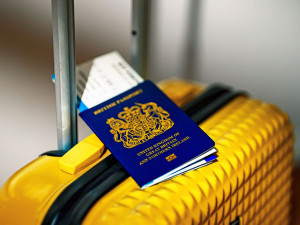
Moving is a frenzied time for everyone, but fewer people have experienced the immense stresses that come with relocating to another country. Besides the logistical issues of finding a new home and transporting your many physical possessions that have accrued over time, you, as a soon-to-be expat, must also navigate foreign tax laws, languages, healthcare systems, and more. It’s a big step, but moving abroad is also a grand opportunity, regardless if you’re following a career opportunity or retiring to an exotic, relaxing locale.
One consideration for emigrants is how you’ll start off on the right foot financially. It’s not ideal to keep your entire nest egg in your country of origin, because they need fluid access to large sums of money at the new destination. For a down payment on a house or vehicles, building a portfolio of foreign investments, paying tuition abroad, and other large expenses, it’s important to have enough cash on hand. Find some helpful tips for moving abroad, both financial and general, below.
1. Move Money En Masse
You’ll be faced with large financial obligations regardless of where you go or who you bring along for the journey. It takes money in bulk to put a payment down on a house or apartment, or even a security deposit and first month’s rent. Getting your hands on a car or SUV is another significant expense, yet all these bills are easily payable from foreign banks—except they come with a price tag. Payments from international banks beg the addition of fees for processing the transfer and moving the money to another account, which eats into your savings. Using a service like CurrencyTransfer.com is recommended to circumvent this reality and transfer money abroad for up to 85% less than a bank’s comparable quote.

2. Pack Light, Or Pay the Price
Most expats will tell you to take a minimalist’s approach to moving overseas. It might be tempting to bring all the possessions that make a cozy, familiar home, but it’s not worth the hassle. Shipping costs for large boxes are high, and many will wind up spending the same amount on transportation that they paid for these items originally. It’s easier on your wallet and your brain to simply sell the things you don’t need and buy the rest at your destination—another reason to transfer money abroad at a better rate.
3. It’s Not About What’s There, But About What’s Not
Before you leave, take careful notes of the things you need but those you might also overlook. Prescriptions for medication, for example, might only be available in the generic version, or require a different prescription. Favorite foods are another forgotten item on the list. While snacks might not seem important amidst one’s greater preparations, neglecting to bring along an auxiliary supply or to find a new source is hard to justify to your future self. There’s nothing that brings on a bout of homesickness like the inability to find one’s favorite comfort food.
If you can’t find a local source for the products you can’t live without, you’ll have to find a supplier in an adjacent country and have them ship it to you in bulk. Regardless of how it’s done, this will require sending money across borders, necessitating that one seek out inexpensive remittance solutions.

4. Protect Your Credit
Credit scores aren’t international. You’ll have to establish a new bank account and get credit as well, which also entails protecting your existing credit. Until you get a new financial identity, your old one is exposed to strange financial systems with different regulations, requirements, and risks. Make sure that if you’re using your credit card to get set up abroad, that your credit isn’t taking a hit back home.
Making Big Moves
Moving abroad is a significant event, both emotionally and financially. Thankfully, with proper financial foresight, the move will be easier on your brain and your wallet as well. With tools like CurrencyTransfer.com and the tips listed above, you’ll be better prepared to take on the challenges of dropping into a new life.



